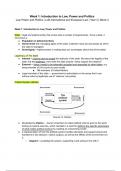Week 1: Introduction to Law, Power and Politics
Law Power and Politics | LLB International and European Law | Year 2 | Block 2
Week 1: Introduction to Law, Power and Politics
State = legal and political entity, that comes with a number of requirements. To be a state, it
must have a:
● Population in defined territory
● Government (the managing agent of the state, institution rules and processes by which
the state is managed)
● Sovereignty = highest power in making laws (no sovereignty above that of the state)
Legitimacy of The State
● Internal = citizens have to accept the authority of the state. Not about the legality of the
state, but the legitimacy, how does the state acquire / keep support and respect?
● External = (does it need) to be externally accepted and respected by other states, e.g.
being member of UN counts as such mostly
■ 189 members of United Nations
● Legal mandate of the state — government is authoritative in the sense that it can
enforce rules by legitimate use of ‘violence’ (via police)
Political System (Model)
Source: D. Easton
● Developed by Easton → found it important to make political science grow to the same
footing as natural sciences, which resulted in a need for defining the specific parameters
of what makes political science by creating an overarching model.
● A representation of how the political system handles demands and support (input) and
transforms it into decision / action (output), as well as the effects of the environment on
it.
○ Support = accepting the system, supporting it and acting in line with it
, ○ Demands = when people stand up against the system due to being unhappy with
it. When a large percentage of people do so, there is a big problem. Also consists
of pressuring the system to take certain values of this group into account, e.g.
improve environmental protection, etc.
○ Importance of interest groups and citizens generally.
○ The wider forces are all the citizens, interest groups, etc WITH government result
in pressuring for COLLECTIVE DECISIONS: they can be:
■ reached,
■ and they can be enforced.
Politics
● What is it?
○ Common interest → Hana Arendt. Idea of politics as something that is positive,
important for the community, and important for individuals.
■ “Politics is acting in concert to make the best of ourselves” strong belief in
a common interest of betterment
■ Dahl: “politics is resolving inevitable conflicts, in a peaceful manner”
○ Competition for power → 2008, economic crisis, stance against wall street.
■ Machiavelli: time of Italian city states, wanted unity. He wrote a book The
Prince covering state crime – how these politicians get to power, keep
power and do all they can not to use it.
● Instilling fear works better than being benevolent
● Seen as the founder of the empirical approach of politics
■ Lasswell (1936): “Politics is about who gets what, when and how?”
○ Other definitions →
■ Easton: top down approach, politics is the ‘authoritative allocation of
values’ by the government
Hague et al. p4: “Process by which people negotiate and compete, in
order to make and execute shared or collective decisions”
● What purpose does it serve?
● Lefort: politics is coping with division and disunity
Government vs Governance
● Government = the manager of the state. Institution and offices included, top-down
management (gov make the laws)
● Governance = more focused on the activity of governing – the process. Public
regulations instead of command and control.
○ Hierarchy of Governance: between Government, civil society (networks,
steering mechanisms) and private sector (markets, influencing governance)





